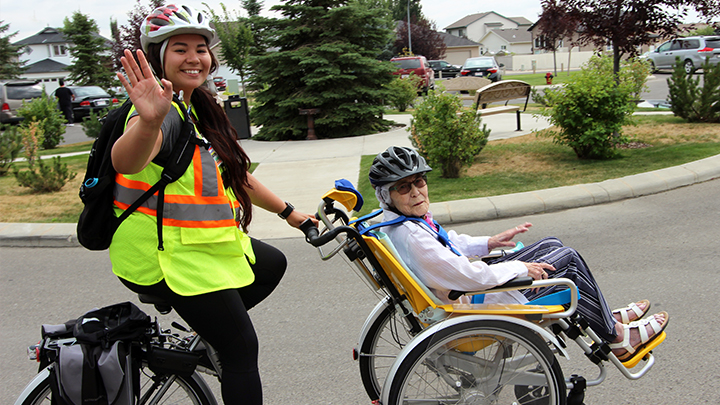
August 21, 2017

Extendicare resident Shirley Matheson, 88, of Lethbridge finds herself on a fun roll as recreational therapy assistant Courtney Brooks pushes the pedals during their wheelchair bike outing. She and other residents across South Zone are racking up the mileage as they tool around their neighbourhoods to celebrate Canada 150 with the equivalent of a coast-to-coast ride.
Story and photos by Sherri Gallant
LETHBRIDGE — They’re in their 80s and 90s, but they’ve been on the road, so to speak, since May as they bike the equivalent of a coast-to-coast ride to celebrate Canada’s 150th birthday.
Earlier this month, if one considers their accumulated mileage, they were already well beyond Montreal en route to the east coast.
This select group of seniors, who live in supportive living facilities across the South Zone, are making the “trip” as passengers in wheelchair bikes. Making it all possible are the Alberta Health Services (AHS) recreation therapy assistants and recreation therapists who enthusiastically push the pedals.
Since their departure at the end of May, their goal is to reach the easternmost tip of Newfoundland within 16 weeks. It’s within reach, and even if they run a bit late, the riders will carry on until it’s achieved.
Perhaps the most positive spinoff for the seniors involved is how their twice-weekly bike rides around the community boost both their mood and energy level. On the days when their therapeutic recreation staff are expected with the bikes, the eager residents can be found waiting at the front door, itching to get going.
As a treatment, wheelchair biking helps to minimize depression in two ways — through the invigorating bike ride and through the meaningful social discussion about the experience and past memories of biking — all during an enjoyable ride in the community.
Helen Marchant, 90, says the first time she saw a wheelchair bike outside of her home, at Extendicare in Lethbridge, she couldn’t figure out what it was.
“I saw this contraption,” she recalls, “And then I came closer and I saw a lady strapped into the wheelchair in the front, and I thought, ‘oh, I’d love to go on that!’ That was the start of it.
“I finally got my wish. We go around the lake and we see the ducks. I love to look at the nice homes around the cul de sac. It’s absolutely wonderful — it brightens up my whole day.”
Marchant shares that her age and recent health problems have caused her to have to stay indoors much of the time; she misses her previous active life.
“I just moved here in June from my apartment,” she says. “I’ve got an illness and I need help now, so here I am. I go to everything I can that my health allows me to.
“When I was young my dad bought me a brand new CCM bike, and I used to love to ride it; we went everywhere — on the highways, all over the place. That’s why I love this so much. It’s fast enough, safe enough, you’re buckled in, you feel free. Sometimes you feel like putting your hands up in the air and going, ‘whoopee do!’ It’s freedom, to get out and enjoy the beautiful days.”
Carolyn Tivadar, the recreation therapist who created the Biking Across Canada project, manages the bike schedules in Lethbridge together with Anita Selby, her colleague and fellow recreation therapist.
“We have 12 bikes across the zone, and two of those are in Lethbridge. We rotate them around different senior facilities,” she says. “We had some setbacks with bad weather and smoke in the air from the wildfires, but we’re doing pretty well. We have bikes in Oyen, Milk River, Cardston, Taber, Coaldale, Crowsnest Pass, Lethbridge, Bow Island, Bassano and Brooks. We’re raising money to get a bike for Raymond. We’ll run the treatment program until mid-September, and we’re trying to get in as many rides as we can until then.”
For every kilometre biked, the team adds three road kilometres in order to make it across the country. All sites with bikes record their kilometres on a common database for tracking.
“We thought it would be a great Canada 150 project,” says Tivadar, “because biking is one of the 150 Participaction activities. We’ve also given all the participants a list of other activities they can do on the bike; activities which are also part of the Canada 150.”
Participating sites have maps of Canada on display in the lobby, with a push-pin to mark their residents’ progress along the Trans-Canada Highway.
Last year, 150 individuals across South Zone experienced improved quality of life, social well-being and increased energy through wheelchair biking.
Every client is assessed by a recreation therapist, who uses standardized tools to measure their leisure functioning, depression and mood. Riders do not have to be wheelchair-bound to participate in the fun outings.
Shirley Matheson, who’s almost 89, finds her outings on the wheelchair bike invigorating.
“Is it ever nice to get out,” she exclaims.
“It’s very hard to be shut in, and I can’t go out without someone taking me. I feel wonderful when I get back from a ride; I look so forward to it. I’m scared to miss it!”